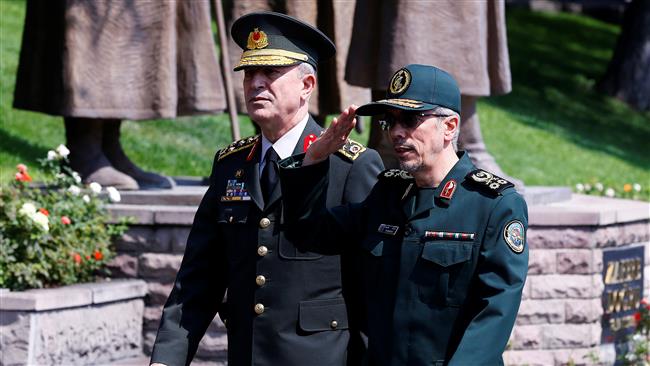Iran hoping to establish arrangements over northern Syria and to block Iraqi Kurdish independence
LATEST
The head of the Iranian and Turkish military have held talks in Ankara on regional issues, including the Syrian crisis and the forthcoming independence referendum in Iraqi Kurdistan.
The Chief of Staff of the Iranian armed forces Maj. Gen. Mohammad Baqeri, has met his Turkish counterpart, Gen. Hulusi Akar, as well as Turkish President Recep Tayyip Erdoğan during a three-day visit which began Tuesday.
The trip, the first by an Iranian military chief, has been framed by State media in both countries as a discussion of bilateral security and a joint fight against terrorism, with little detail.
However, topics include the Syrian conflict, where the two countries have been on opposite sides since 2011 but have recently been drawn together through Russia’s brokering of talks and proposed “de-escalation zones” throughout the country.
Iran is wary of the zone in northwest Syria, which permits the opposition to maintain control of Idlib Province and parts of surrounding Aleppo, Latakia, and Hama Provinces. Turkey in invested in the zone in northern Aleppo, having launched its military intervention in August 2016 alongside the rebels of the Free Syrian Army.
Both sides are also wary about the influence of the Syrian Kurdish Democratic Party (PYD) and its YPG militia, who have taken territory across northern Syria from the Islamic State. Turkey considers the PYD and YPG to be part of the Turkish Kurdish insurgency PKK, while Iran — like the Assad regime — is opposed to a federal Syria in which Kurdish groups have autonomy.
The Kurdish issue is also driving the Iranian-Turkish discussions over Iraq. Iran is hostile to Kurdish independence, and Turkey — while having better relations with the Iraqi Kurdish Regional Government than with the PYD — also objects to any breakway from Baghdad.
The commanders have also discussed the Turkish-Iranian border issue. The Iranian Kurdish group PJAK has attacked Tehran’s security forces in northwestern Iran, while the PKK has carried out cross-border attacks on Turkish targets.
Baqeri is accompanied by the commander of the Revolutionary Guards’ ground forces, Brig. Gen. Mohammad Pakpour; the head of Iran’s border guard command, Gen. Qasem Rezaei; Deputy Foreign Minister Ebrahim Rahimpour; and several military commanders.
Detained Opposition Leader Karroubi Begins Hunger Strike
Green Movement leader Mehdi Karroubi, under strict house arrest since February 2011, has begun a hunger strike to demand a public trial.
Karroubi’s son, Mohammad Taghi Karroubi, said on Twitter that his father is also demanding that security guards leave his apartment.
پس از نماز صبح امروز پدر كه پيشتر دو خواسته شان را مطرح كرده بودند و پاسخى نگرفتند وارد اعتصاب غذاى خشك شدند. pic.twitter.com/xas4srmZ1z
— Mohammad Karoubi (@KaroubiMT) August 16, 2017
Karroubi’s wife Fatemeh confirmed, “After an advice by a doctor designated by the Intelligence Ministry and my insistence, he only took his heart medication today and refused to eat or drink.”
She said, “If the house arrest is to continue, he wants to be put on trial in public, after six and a half years under house arrest, he wants the authorities to announce when they will hold a trial in public.”
Karroubi was reportedly hospitalized early Thursday, a week after he was returned to the apartment after almost three weeks in care for a low heart rate.
Karroubi, Mir Hossein Mousavi — also a candidate in the disputed 2009 Presidential election — and Mousavi’s wife, activist and academic Zahra Rahnavard, were seized 6 1/2 years ago amid regime fears of ongoing protests.
President Hassan Rouhani said in his 2013 campaign that he would pursue the release of the trio, but the Supreme Leader has blocked any move, including a trial.

